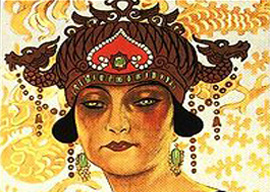
September 27, 2012

Turandot is by no means the worst offender on the silliness scale. It’s not just an Italian thing, either. Wagner’s four-opera Ring cycle concerns a gold ring that bestows supernatural powers upon its wearer, yet two different characters are overpowered and have the ring taken from them.
Silliness-wise, Wagner is a serial offender. In Act Two of The Flying Dutchman we see the heroine, Senta, sighing and swooning over a portrait of “a ghostly man” from a legend. Then her dad comes in with the man in the portrait, whom he has just met by chance. Right.
For entire-opera silliness, my vote would go to Puccini’s La fanciulla del West, another love-conquers-all romance in which a cast of Wild West stereotypes”prospectors, poker-players, bartenders, bandits, Indians”sing their way through the story in Italian. It’s the original spaghetti Western. There’s some lovely music, but I giggle quietly through the whole thing, thinking of National Lampoon‘s Il Showdown a Rio Jawbone.
Bellini’s La straniera may have a daft plot, but listen as the immortal Montserrat Caballé enters the Act One trio. With such music, you forget the barmy plot.
You also forget what a jerk the composer was. Bellini’s English-language biographer confesses he couldn’t get to like the guy. Opera composing seems not to attract nice people. Cherubini had a reputation as “the rudest man in Europe,” according to Berlioz. And read up on Wagner if you want to explore the furthest shores of egoism.
I saw Caballé perform at the Met in 1985 in Tosca, with Luciano Pavarotti as tenor lead. As the two lard-tubs waddled and wobbled across the stage playing the parts of passionate young lovers, exchanging the most unconvincing embraces”neither could get their arms all the way around the other”you had to keep reminding yourself that this is a tragic opera.
The whole art form is absurd. In Act One of Parsifal, Wagner’s stage directions require that “A wild swan flutters feebly from over the lake, strives to keep up, and finally sinks dying to the ground.”
Swans are not that trainable, and if they were, the Humane Society would be picketing Lincoln Center. A stuffed version of the creature is usually just dropped from the flies, landing on stage with a THUMP! to bursts of smothered snickering from the audience. Robotics may one day give us a snicker-free Parsifal.
With all this nonsense, why do not-very-musical persons such as myself never pass up a chance to see the classics, even when there’s a list of pending household repairs longer than Die Meistersinger‘s libretto? It’s the music, of course”more precisely, the voices. The rigorously trained human voice is, for me, the most beautiful of all instruments. It communicates to me sensations I get from nowhere else.
A quarter-million years ago we were hooting to each other across the savannah while an accompanist whacked on a hollow log with a stick. Now we have these superb voices carrying sublime music to lift us out of what Frances Cornford called “the long littleness of life” up into a realm of esthetic bliss. Civilization!”I’m a big fan.